The Spark December 2010 – January 2011
Mike Kay, an editor of The Spark, caught up with Mike Treen, National Director of Unite just after its first national delegates conference on 25-26 November, which was followed by a one day political conference.
The Spark: This was the first national Unite conference. Why did you decide to take that step now?
MT: From our point of view it’s a bit of a coming of age of Unite. The Auckland project was started 5-6 years ago based on the transformation of an already existing union with a small membership of 100-200 members, a place where, on a voluntary basis, some union officials were giving support to workers who were unable to get representation through traditional union structures. The structure of that organisation no longer fits Unite today. We now have 8000 financial members, broad industry representation and membership engagement and involvement is through the delegates. Given the character of the industries we work in, with a high turnover, we depend all the more on the delegates for communication, mobilisation and so on. We were unsuccessful in general membership meetings, except for a few workplaces. So the most democratic aspect of membership input is through the delegates, so we decided to base the democratic decision-making structure through a national delegates conference, and even, ambitiously, to project doing that every year. Continue reading “Unite Union’s first national conference”
The West Coast mining tragedy – An international and historical class issue
Byron Clark The Spark December 2010 – January 2011
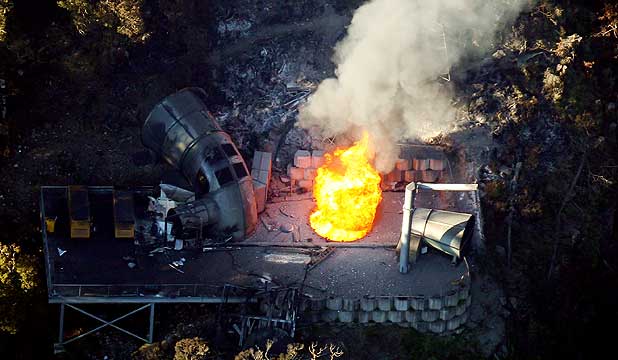
There is a famous slogan from a banner carried by striking miners at Waihi in 1912, “If blood be the price of your cursed wealth, good god we have bought it fair”. The slogan brings up images of early twentieth century industrialism; gruelingly hard work in unsafe environments, ruthless exploitation of workers by wealthy capitalists, and accidents abounded. In light of the Pike River mine disaster, the slogan does not seem as anachronistic as it may have prior to November. Indeed, not since 1914 when 43 miners were killed in a mine explosion in Huntly has New Zealand seen a mining disaster of such magnitude. Many have questioned how this disaster could have happened in a developed country, in the year 2010. It’s not the first one however; in April 29 miners died in a gas explosion in West Virginia, USA. The Pike River tragedy has an eerie sense of deja vu for some. Lawyer Davitt McAteer, who is heading an investigation of the USA deaths, was quoted by The New Zealand Herald as saying “You can’t suggest that the mining industry is going forward into the 21st century with the rate that it’s killing people.”
As the dust settles on the West Coast, it is becoming increasingly clear that the pursuit of profit was put ahead of the safety of workers. While Pike River Coal is one of New Zealand’s largest corporations, and valued at $400 million, the company made a $54.1 million loss between July 2006 and June 2010, and was under pressure from its major shareholder, New Zealand Oil & Gas, to improve its performance. The safety standards of the mine have been condemned by experts such as Andrew Watson, the operations manager of United Kingdom Mines Rescue Operations, who told the New Zealand Herald that methane levels had to have reached 5 to 15 percent of the atmosphere for the explosion to occur. In British mines, work stops if methane levels reached just 1.25 percent, and mines are evacuated once they reach 2 percent. Watson stated that “either the warning system was inadequate, or it was not sufficiently monitored”. The most likely cause of the methane build up was a power outage that disabled the mine’s ventilation system; there was no backup generator. Geologist Murray Cave had warned back in 2007 that the geological risks at the mine site included a pit bottom with deep, highly gassy coals and the associated risk of “outburst”, or gas explosions. The Hawera fault zone running through the mine could be an additional source of methane. Continue reading “The West Coast mining tragedy – An international and historical class issue”
Resistance Mounts Against the Blood Budget
éirígí 01/12/10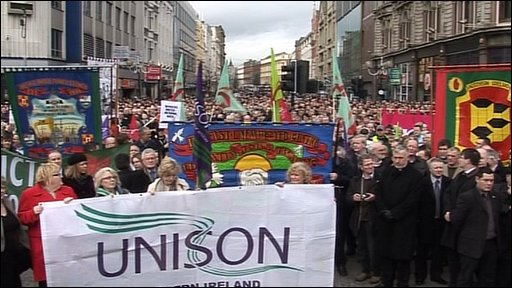
As the clock counts down to what many believe will be the harshest budget in the history of the Twenty-Six County state, resistance appears to be gathering momentum.
éirígí has long argued that the savage assault being waged against the working class by the neo-liberal establishment in Dublin can be overturned through a sustained campaign of civil disobedience and mass protests. In mobilising for the fight back, éirígí has called for people to lobby in their workplaces, their unions and their communities for the organisation of a general strike. Continue reading “Resistance Mounts Against the Blood Budget”
The Mana By-Election experiment
Note that this article does not necessarily represent the views of the whole party.
Don Franks

Below the big beaming blue and red billboards it was vacuous capitalist personality politics as usual.
Labour’s candidate claiming to be “working for Mana’ was Labour Party leader Phil Goff’s press secretary.
The best National’s Hekia Parata could produce for a slogan was a bastardisation of her own name – Vote Parata- “Heck yeah!”.
In the end Labour’s Kris Faafoi won the seat with 10,397 votes to Parata’s 9317.
National came within 1080 votes of snatching a safe Labour seat while their party is in government. Parata shattered Labour’s previous 6000-plus majority, turning Mana from the ninth safest seat in the country and one of Labour’s strongest bastions to a marginal one for the 2011 elections. Continue reading “The Mana By-Election experiment”
Law change during industrial disaster
Daphna Whitmore
While the Pike River mining disaster was unfolding the National Government passed new laws to curb workers’ rights.
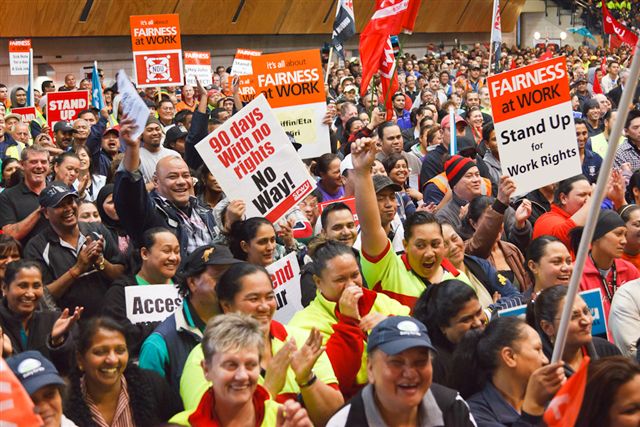
International mining experts say that the mass deaths in Pike River should not have happened in a modern mine in a developed country. Perhaps they were unaware of the marginalised status of unions in New Zealand? The new laws are designed to keep unions even more sidelined.
The Employment Relations Amendment Bill (No 2) and Holiday Amendment Bill make the following changes from April 2011: Continue reading “Law change during industrial disaster”
Ireland country report
The following report was drawn up by the Irish Marxist group, Socialist Democracy
10 November 2010
I Introduction
The Irish State is one of the most globalised in the world and for nearly two decades was held up as a model of economic development across Europe and further afield. Now it is in severe crisis and faces bankruptcy. The Irish Government has applauded its ‘first mover’ advantage in its efforts to enforce austerity – that it was taking the steps that sooner or later all other states would be forced to take. The small and weak character of the Irish State means that it often exaggerates trends that exist elsewhere. For all these reasons the Irish experience is an important one for others to study.
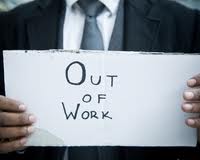
Continue reading “Ireland country report”
IMF Will Entrench the Economics of the Madhouse
The following article is by the Irish socialist-republican group, éirígí
20/11/10
ICTU Protest, Saturday November 27th, 12pm, Wood Quay, Dublin Budget Night Protest, March to Leinster House. Assemble 5.30pm, Tues December 7th, Wolfe Tone Monument, Stephen’s Green, Dublin Introducing the catastrophic €400 billion [£340 billion] blanket bank guarantee scheme in September 2008, Twenty-Six County finance minister Brian Lenihan was keen to offer reassurance to those genuinely fearful of the consequences of such economic recklessness.
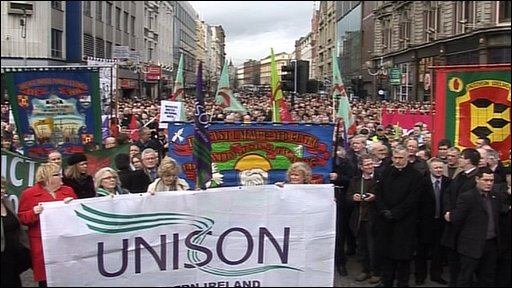
Continue reading “IMF Will Entrench the Economics of the Madhouse”
Pike river mine mass killing
As we learned this afternoon, the rescue we hoped for will not take place. Because of a second major explosion the miners at the Pike river site are all almost certainly dead.
Hard questions remain to be answered and there will be a struggle for the truth to see the light.
As that inevitable struggle unfolds, there are two positive ways workers can respond to this mass killing. One is to donate to the relief fund for the bereft families and community.
The other way is for organised labour to get its bottle back, so that we’re better organised to prevent future fatal industrial accidents killing our friends, sons and daughters.
The union role in the Pike river disaster has been marginal. The one time it was openly advanced, the boss class closed ranks and drew their claws.
Senior Cabinet Ministers rounded on Australian journalists covering the Pike River coal mine crisis, labelling their questions “disgraceful” and branding one a “tosspot”.
Police Minister Judith Collins this afternoon heaped scorn upon Ean Higgins, from The Australian, for some questions he asked at a media conference this morning.
“Frankly, those journalists need to sit down and think about what they’re actually doing. What they are doing is they are cheapening the work of other journalists working in Greymouth and they are absolutely not respecting the terrible time the people of Greymouth are going through,” Collins said.
Energy Minister Gerry Brownlee earlier blasted Higgins as “boorish” for asking why a “local country cop” was leading the rescue operation.
Collins said the question was “disgraceful”.
What caused all this rukuss?
Foul mouthed Australian Ean Higgins had employed the “u” word.
Higgins asked why Superintendent Gary Knowles was heading the rescue operation instead of a mining union.
Police superintendent Knowles then asserted that the disaster “wasn’t a union matter”.
If Knowles is right on that, then unions are irrelevant and should stop collecting dues and shut up shop.
If Knowles is wrong, Kiwi unions need to find the guts to stand up and show why we deserve to take up space.
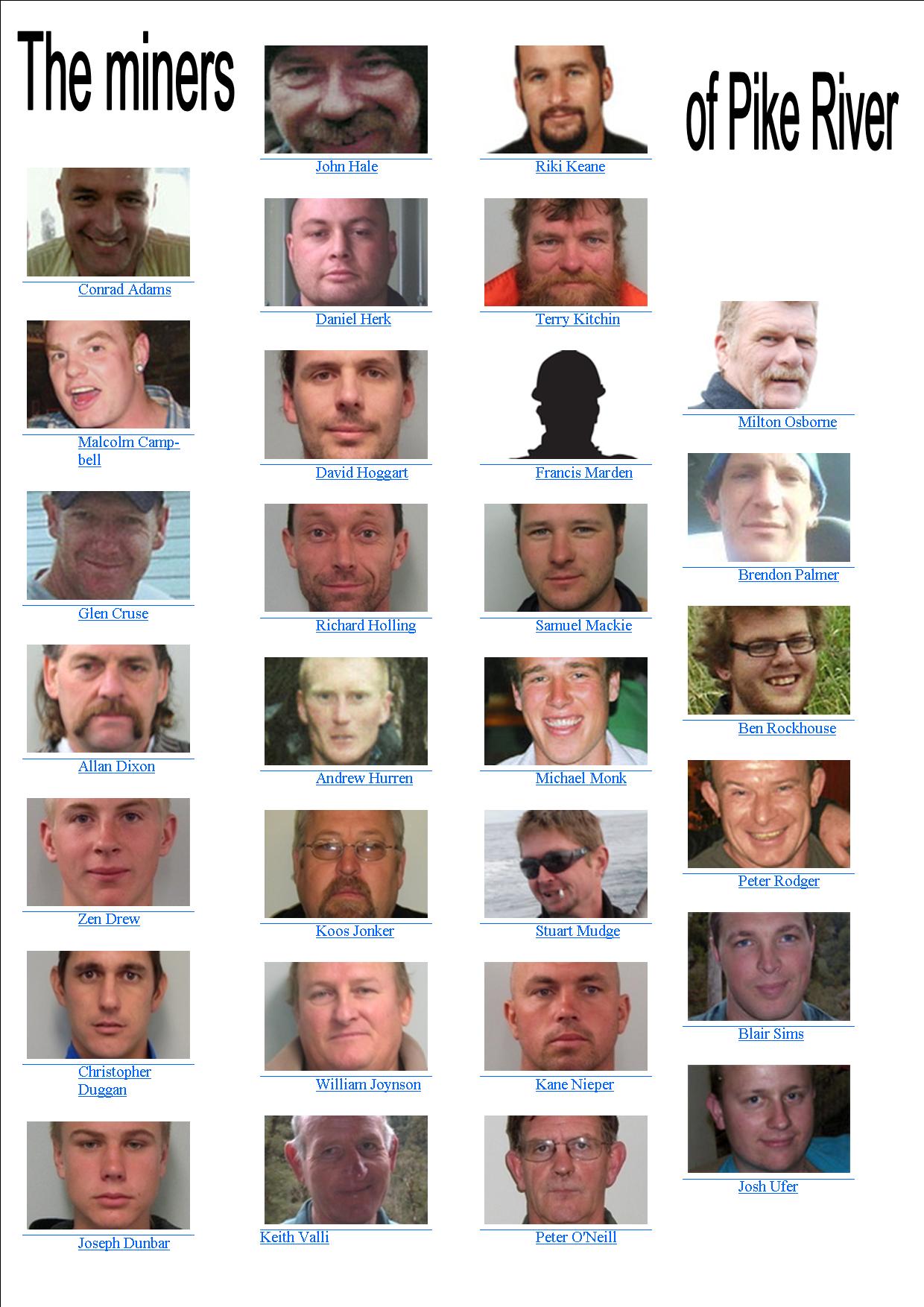
Review:Mates and Lovers
In advance of Ronald Trifero Nelson’s theatrical adaptation of Mates and Lovers: A History of Gay New Zealand, Spark correspondent Ian Anderson reviews the original book.
The Spark November 2010
Chris Brickell’s Mates and Lovers: A History of Gay New Zealand is an essential book for anyone interested in local social history. The first book of its kind focused on New Zealand, the book draws on court records, personal collections, press coverage and various other sources to map out the changing social formation of “homosexuality,” as it was dubbed in Europe over the late 19th Century.
As Brickell explains, that very word “homosexuality” did not reach popular discourse in New Zealand until the mid 20th Century. With that in mind, the book covers the shifting roles that men who have sex with men have played in society, and the shifting language to describe these roles. Continue reading “Review:Mates and Lovers”
Solidarity with Pike River workers
The Workers Party extends its solidarity to the families and friends of the 29 workers currently trapped in the Pike River mine.
This terrible disaster is the latest in a steady stream of industrial carnage.
According to the official government website http://www.whss.govt.nz/statistics.shtml
there are about 100 fatal work related injuries in New Zealand each year. That figure does not include premature death from workplace related disease, which is estimated at being 700-1000 deaths a year.
The primary cause of so called industrial accidents is capitalism’s drive for maximum profits. That drive leads to under staffing, speedup, lack of safety equipment provision, deunionisation of worksites with consequent worker deaths and debilitation.
It remains to be seen what caused the latest accident, at the moment the priority is for the workers to be rescued as soon as possible.
